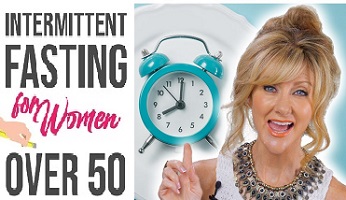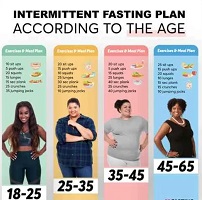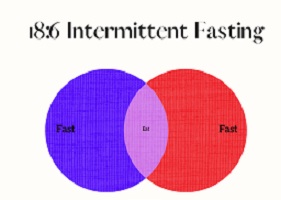Intermittent Fasting For Women Over 50
Best Intermittent Fasting For Women Over 50 in 2023: What You Should Know. Please Watch >>>>
- What to Know About Intermittent Fasting for Over 50 Women
- Intermittent Fasting for Women After 50 Years: 7 Tips for Success
Fasting has been practiced by people of all ages since time immemorial. Our ability to fast is fairly widespread.
Table of Contents
Relared Articles >>>>
- Intermittent Fasting By Age and Gender
- Intermittent Fasting for Muscle Gain and Fat Loss
- Intermittent Fasting for Weight Loss
- Intermittent Fasting ~ What Age Is Best for Man/Woman
However, this does not imply that intermittent fasting (IF) affects everyone equally. You’ll learn about intermittent fasting for women over 50 today.
Intermittent Fasting For Women Over 50

If you’re wondering and searching for answers on whether you should incorporate intermittent fasting when you’re over 50 years, I hope this post provides some background information to help you get started.
Before you begin intermittent fasting (IF), I want to emphasize that you should first consult with a licensed medical physician.
Because IF is not for everyone, it is something to discuss with a professional.
Weight loss can be difficult for women approaching menopause for a variety of reasons – the majority of which are related to hormonal balance
Hormones and Women Over 50
During perimenopause and menopause, estrogen levels fluctuate and become unpredictable before falling to extremely low levels.
This drop in estrogen is accompanied by changes in cortisol, thyroid hormones, serotonin, and sex hormones.
Some of the symptoms of menopause are caused by hormonal shifts.
During menopause, your insulin sensitivity may decrease, making it more difficult to process sugar and refined carbohydrates.
This is known as insulin resistance, and it can make you more prone to gaining weight around your midsection.
Muscle mass may also decrease as fat mass increases, resulting in less metabolically active tissue and greater difficulty to maintain a healthy weight.
50+ Women Weight Struggle
Weight loss can be difficult for women over the age of 50.
This can be caused by a variety of factors. The main cause is frequently a slowed metabolism.
The faster your metabolism, the more lean muscle you have. However, as we get older, we lose lean muscle mass and become less active.
The end result?
Stubborn body fat that refuses to budge
Intermittent fasting has grown in popularity in recent years due to its numerous health benefits and the fact that it does not limit your food options.
Fasting has been shown in studies to improve metabolism, and mental health, and possibly prevent some cancers.
It can also protect against certain muscle, nerve, and joint disorders that can affect women over the age of 50.
What Is Intermittent Fasting?
Intermittent fasting (IF) is simply limiting self to eating within a designated time frame.
There are several IF variants to choose from. Choose the type that best fits your lifestyle, and then consult with your doctor.
Intermittent Fasting Schedule
The daily method; is the most widely used IF method. The daily method usually adheres to a 16/8 or 18/6 rule.
This entails eating regular, healthy foods for 6 to 8 hours per day and fasting for the remaining 16 to 18 hours. This has been discovered to be the most sustainable method.
You can get started with other timing variations. A 12/12 diet consists of eating for 12 hours and then fasting for 12 hours.
You can then work your way up to a stricter schedule when ready
Health Benefits & Side Effects of Intermittent fasting
Intermittent fasting women can enjoy several benefits when engaging in the diet plan.
What Are the Benefits of Intermittent Fasting? Why is intermittent fasting for women over 50 a good idea?
Weight loss isn’t the only advantage of intermittent fasting. Fasting is an ancient practice that is still practiced regularly in some cultures today.
Health benefits are a welcome effect of IF, and many of them are especially beneficial to women’s health.
Other benefits include:
- Musculoskeletal health
- Metabolic health
- Mental health
- Improved memory
- Tissue health
- Physical performance
- Heart health
Side Effects of Intermittent Fasting
- Bad Breath
- Headaches
- Hunger Pangs
- Digestive Problems
- Mood Swings and Irritability
- Fatigue and Low Energy
Can IF Work for Women Over 50? Does intermittent fasting work for post-menopausal women?
The quick answer is yes. Both premenopausal and postmenopausal women have shown promise with intermittent fasting.
Body weight decreased significantly from baseline in both groups in a study that compared the weight loss effectiveness of alternate-day fasting (ADF) among pre-and post-menopausal women.
This suggests that intermittent fasting, regardless of menopausal status, may be effective for weight loss.
Tips to Start Intermittent Fasting For Women After 50
7 Fasting Tips for Women Over 50
Ladies over 50 should consider these tips to create a sustainable IF practice.
- Start slow
- Get enough calories
- Prioritize protein
- Resistance train
- Get enough electrolytes
- Consider a Keto diet
- Eat a nutrient-dense diet
The Best Foods to Eat During Intermittent Fasting
The Benefits of Intermittent Fasting May Extend Beyond Calorie Restriction
Some nutritionists believe that IF only works because it helps people naturally limit their food intake, but others disagree.
They believe that intermittent fasting produces better results than traditional meal plans containing the same number of calories and other nutrients.
Several studies have even suggested that fasting for several hours a day does more than just limit the number of calories consumed.
Maintaining a Sustainable Fasting Routine
If you want to succeed at fasting, you must incorporate it into your daily routine.
You must make it a habit.
One key to habit formation
Accountability
Specifically, you want to be accountable to yourself; But how?
By keeping track of your progress; when you track yourself on a daily basis, your personal accountability skyrockets.
Intermittent Fasting for Women Over 50 the Bottom Line
For many women over 50, intermittent fasting is an effective way to lose weight. Because of a slow metabolism, losing weight at this age can be difficult.
Furthermore, insulin resistance makes it difficult for your body to process sugars and carbohydrates.
Women over 50 years can reap numerous health benefits from intermittent fasting.
Aside from the fat loss, you can benefit from improved heart health and diabetes management.
Intermittent fasting, on the other hand, is not for everyone.
If you decide to try it, keep an eye out for side effects like headaches, hunger pangs, or fatigue. If this occurs and does not improve within a week or two IF may not be the best method for you.
Before embarking on an intermittent fasting diet plan, consult a dietitian to reduce the risk of side effects and determine what is best for your goals.
FAQs
Is intermittent fasting effective after menopause?
According to research, intermittent fasting after menopause can aid in weight loss and management.
Does intermittent fasting work for women over 50?
The quick answer is yes. Both premenopausal and postmenopausal women have shown promise with intermittent fasting.
What is the best type of intermittent fasting for women over 50?
The daily method usually adheres to a 16/8 or 18/6 rule.
This entails eating regular, healthy foods for 6 to 8 hours per day and fasting for the remaining 16 to 18 hours.
This has been discovered to be the most sustainable method.
Can menopausal women lose weight by fasting intermittently?
Body weight decreased significantly from baseline in both groups in a study that compared the weight loss effectiveness of alternate-day fasting (ADF) among pre-and post-menopausal women.
This suggests that intermittent fasting, regardless of menopausal status, may be effective for weight loss.
What is the best way to lose weight for a 50-year-old woman?
The 8 Best Ways to Lose Weight After 50
- Learn to enjoy strength training
- Team up
- Sit less and move more
- Bump up your protein intake
- Talk to a dietitian
- Cook more at home
- Eat more produce
- Hire a personal trainer.
What should I eat during 16 8 intermittent fastings?
On the 16:8 diet, you consume only unsweetened beverages such as water, coffee, and tea for 16 hours per day.
You eat all of your meals and snacks during the remaining eight-hour window.
What can I drink while fasting intermittently?
During the fast, no food is permitted, but water, coffee, tea, and other non-caloric beverages are permitted.
During the fasting period, some forms of intermittent fasting allow for small amounts of low-calorie foods.
Taking supplements while fasting is generally permitted as long as they contain no calories.
Is coffee used to break a fast?
The short answer is that you can drink coffee while fasting intermittently. However, there is a major caveat to this answer:
While intermittent fasting, you can drink black coffee, but coffee drinks with cream, sugar, or other forms of calories technically break your fast.
What is the best type of intermittent fasting for belly fat?
Pilon recommends intermittent fasting combined with regular weight training for fat loss.
By fasting for one or two 24-hour periods during the week, you allow yourself to consume slightly more calories on the other five or six non-fasting days.
Is 16/8 intermittent fasting effective for women?
Loss of weight
Several studies indicate that intermittent fasting may be an effective weight-loss strategy for women.
Women over the age of 60 saw an average body fat loss of 2 kilograms – about 4.5 pounds – after 6 weeks of following a daily 16/8 intermittent fasting plan
How can I lose 20 pounds after menopause?
Tips for Losing Weight After Menopause
- Keep things simple. Diet plans and exercise regimens are frequently expensive and make flashy promises.
- Invest in cardio. Weight loss is caused by burning more calories than you consume.
- Remember strength training. Fat burns fewer calories than muscle.
How long should a female do intermittent fasting?
Daily 14-16 hour fasts, the 5:2 diet, or modified alternate-day fasting are the best types for women.
While intermittent fasting has been shown to be beneficial for heart health, diabetes, and weight loss, some evidence suggests that it may harm reproduction and blood sugar levels in some women.
What is the most effective way for a postmenopausal woman to lose weight?
Simply stick to the fundamentals of weight management:
- Increase your movement. Physical activity, such as aerobic exercise and strength training, can help you lose weight and maintain a healthy weight.
- Consume fewer calories
- Examine your sweet tooth
- Limit alcohol
- Seek support
How can I boost my metabolism after the age of 50?
How to Boost Metabolism after the Age of 50
- Build Muscles Mass.
- Engage in Aerobic Exercise.
- Stay hydrated.
- Eat Healthily.
- Eat smaller meals more frequently.
- Get Enough Rest.


